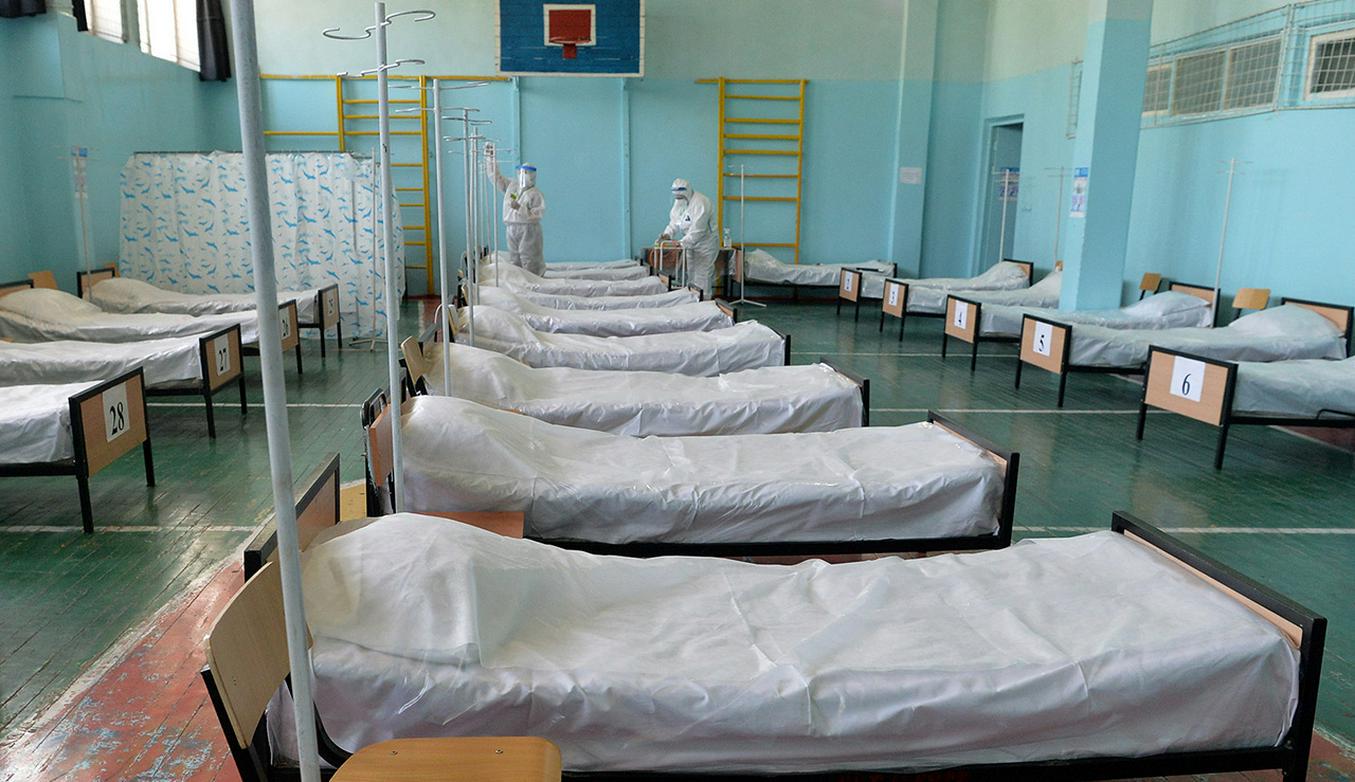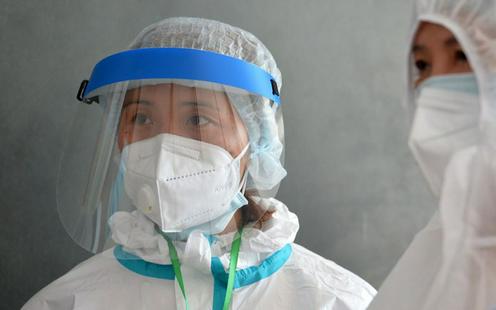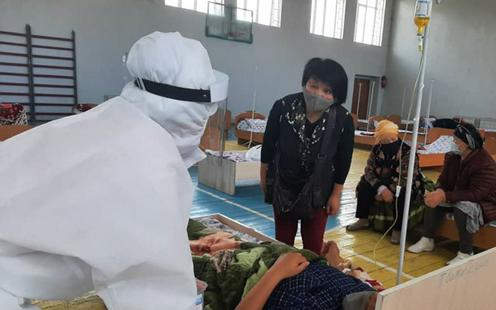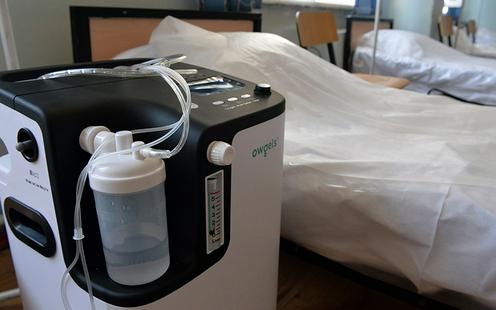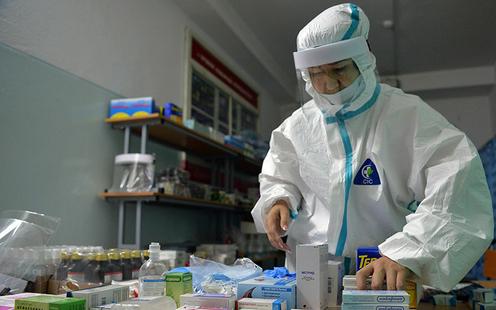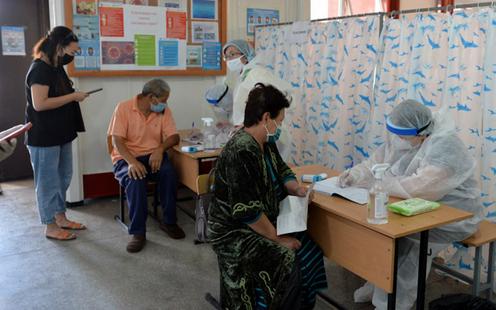The fight against COVID-19 in Kyrgyzstan continues to be reminiscent of the battle with the fabled hydra – you chop off one head and two more grow in its place. Besides the insidiousness of the virus itself, there are other, very concrete reasons why the country is struggling. Relatives and loved ones of those who are sick roam the city in search of medication, without observing the hygiene rules that are so crucial under an epidemic, and not only fall ill themselves but also infect others. Rural doctors try to be sparing with limited PPE stocks and also fall sick. Volunteers have even less protection from the virus than medical workers. The sick are unable to gain admission to hospitals, and, when they do, they are dying in intensive care units due to a lack of equipment. Yet in spite of all this, hope remains.
On the street where I live in Bishkek, there are three pharmacies lined up one next to the other. Small queues periodically form outside of one or the other of them. A few words carry from there to my window: “Heparin, Klexane, Actemra, Levofloxacin...” – one of those standing in queue is reading off a list of medicines into the telephone. None of them are maintaining any real social distance, standing a half metre from one another at the very most. Everyone is scared that one of the other queuers’ patience will fail and they will rush to the door without waiting their turn. Most of them are wearing masks, no one has gloves...
Having obtained the medication, people disperse: some get back into their cars, some disappear into taxis or – if it happens to be morning or evening – into public transport, which currently operates between the hours of 7 am and 10 am and from 5 pm to 9 pm in Bishkek.
Most of those who are waiting in the queue have probably been in close contact with people suffering from COVID-19, and may well be carrying the infection themselves. On their way home, or to the hospital if that is where their loved one is staying, they could easily infect a large number of people. No one seems to have thought about this, however. The medication is needed urgently, the state has no way of fully controlling people’s movements, and forcing them to follow sanitary regulations is difficult: people are under a great deal of stress and feel certain that their loved ones’ lives depend on their trip around the city in search of medication.
The rushing and panicking in Kyrgyzstan today, though, concerns not only medicine. People are having to themselves ensure that they obtain a hospital bed, access to an oxygen concentrator, and even a ventilator.
“We don’t blame the medical staff”
Nargiz Umetalieva’s family took all the necessary precautions when her father was hospitalised. Nargiz changed her mask every two hours, wore plastic gloves and, after her father was taken in to hospital, remained in strict self-isolation. The following is Nargiz’s account of how she tried to obtain medical assistance for her father.
An X-ray showed that the 58-year-old man was suffering from double pneumonia. Doctors spoke to Nargiz on the phone and explained what medication she should obtain for her father. Due to a shortage of medication, she had to order Heparin, Klexan, vitamin C, an oxygen bag and even Arbidol from Moscow.
Two days later, however, her father’s condition deteriorated markedly. In order to put him on a drip and keep track of his blood oxygen level, he was taken in to Bishkek’s temporary coronavirus day hospitals and to private clinics. Then the family got hold of a pulsoximeter and it became possible to check his blood oxygen levels at home.
– On the night of 14 July, Dad got really bad, even though we’d had him on antibiotics for 7 days, Nargiz recounts. – Since my parents live in Aleksandrovka, we took him to the infectious diseases hospital in Belovodsk. We waited for exactly 2 hours. Dad’s blood oxygen level fell to 85 (the normal range is 94% and above), his temperature was 39 degree and he couldn’t walk.
Nargiz brought along the X-ray images showing that her father had double pneumonia. In spite of this, the hospital refused to admit him, since he had not taken a PCR test. According to Nargiz, she had to literally beg the doctors. They told her that they could not take responsibility for her sick father, since they had neither medication nor oxygen concentrators, and he would not get the care he needed at their clinic. The hospital nevertheless agreed to provide her father with some first aid. The family managed to get hold of some Levofloxacin, and it was administered to her father using a drip.
– I feel sorry for the staff at Belovodsk, Nargiz says. – They are working non-stop, without gloves, and are exhausted. We don’t blame the medical staff, we understand the situation they are in.
The doctors, however, categorically refused to allow her father to stay at the hospital.
– I asked them: “What if he dies?” Nargiz recalls. – To this they answered: “That’s not our problem anymore.”
Nargiz started to search around frantically for somewhere else she could take her father. In the end she succeeded in having him admitted to the National Hospital in Bishkek, where they had a free bed.
– The conditions there are much better, Nargiz says. – They said that they had enough medication and they would warn us if we needed to buy extra. Dad likes it there, his temperature began to fall immediately and his mood improved. We’re just praying that everything turns out well...
It should be pointed out that Nargiz’s family have their own means of transport, so they were able to drive her sick father around independently. Since her father first fell ill, Nargiz has spent more than $450 on medication and tests alone.
For the majority of Kyrgyzstan’s population, of course, such expenses are simply impossible – according to data from the National Committee on Statistics, the average monthly wage for 2019 was just $236. In reality it is even lower than this. For the average citizen, the only way to obtain medical care is at a state-run facility. In theory, care there is free, but in practice patients and their families have to pay for nearly everything: from PPE to the films used for X-rays.
A new mode of operation
Amid the worsening situation, it fell above all to the state to make up the shortfall in hospital capacity – which it did by opening makeshift day and night hospitals and expanding temporary observation facilities. The new sites were sorely needed because existing hospitals no longer had enough beds to meet the inflow of new patients. The newly-established day hospitals now accept patients between 8 am and 8 pm, carry out examinations and, if necessary, provide the necessary initial medical care. If a patient requires hospitalisation, they will be kept at the day hospital until a bed becomes free at one of the main hospitals. The night hospitals admit patients from 9 pm to 9 am. They function as a point of emergency assistance if the permanent facilities are out of beds but urgent medical intervention is still required. The night hospitals are designed essentially for the seriously ill, those who cannot wait until the day hospitals open their doors the following morning.
In addition to this, private businesses have reacted swiftly to the new circumstances, with many private hospitals partially reconfiguring themselves to treat COVID-19 patients.
Kyrgyz civil society has also been working actively and effectively. Mutual aid co-ordinations have been set up and groups of volunteers have sprung up to help with all manner of issues, from locating and ordering medication from abroad to providing medical assistance and oxygen concentrators to people in their homes – the Youth Initiative Centre has been particularly active in this respect. Young people are mobilising and turning up at observation wards and hospitals to provide assistance to healthcare professionals, even if it is just in terms of daily chores – cleaning, providing food and so on.
We’re trying to save masks and protective suits
At present, the word “volunteer” is being uttered with almost the same level of veneration as the phrase “healthcare worker”, since it is precisely Kyrgyzstan’s numerous voluntary workers who have become the symbol of the country’s fight against the pandemic. Serving as a volunteer is something of a badge of honour, and in these difficult times almost all those who are in a position to provide some kind of assistance have joined the ranks of the volunteers. But has anyone given any serious thought to these volunteers’ safety? There are not even enough hazmat suits for medical workers themselves.
And it is not only a matter of protective suits – medical staff in rural areas are in desperate need of face masks, gloves, pulsoximeters and oxygen concentrators too. This point has been raised above all by Leila Keldibekova. With the help of several volunteers, she has set up an independent database of medical facilities in Kyrgyzstan that are in need of assistance. For the last two weeks already, she has been calling medical workers all over the country, including rural obstetric units and GP’s clinics.
This might sound like relatively easy work, but it is not. During one phone call, Leila heard a statement from one doctor that made her cry: “We are trying to save the suits and masks, so we’re not wearing them. We only have two sets.”
Of course, the situation is not quite as bad as this everywhere, but Leila says that she hears something similar “about half the time”. Her team are now trying to gather as much information as possible in order to expand the database, which can then be used by volunteer groups and the platform birge.pro (“together.pro”). They hope to be ready within a week, though Leila is aware that by then the situation at many facilities may have changed.
Thrown into the breach
Since the start of the epidemic, resident doctor Saltanat Omurdinova has given healthcare guidance to many people and provided direct medical help to dozens of others. She worked for Kyrgyzstan’s coronavirus hotline “118 service”, where requests for medical help from members of the public are processed. Saltanat has given injections and put people on drips, besides dispensing direct medical advice to those in need.
Saltanat knows what difficulties young resident doctors have come up against during the pandemic, and is worried that the number of victims among medical workers will rise. She also thinks it totally unfair that a shop sales consultant can earn several times as much as a doctor. In her opinion, the situation whereby doctors are forced to take up a second job just to survive is totally unsustainable.
When all this “coronavirus chaos” began, Omurdinova explains, all medical workers started to be called up for work in observation wards and to serve on the front lines. They were, however, promised high salaries and all the necessary protection.
– But then, according to other resident doctors who stepped forward to volunteer, none of this materialised, Saltanat says. – They were told that they would have to provide everything themselves, food too. PPE and everything else was in short supply. I refused. Even when they tried to put pressure on us – appealing to our sense of patriotism and professional duty: we had to help, they said, “others are going along but you’re not”. They try to play on the theme of patriotism: “guys, help out the homeland, it won’t be forgotten”, and they promise high wages and benefits. Many go along out of a feeling of duty, because they want to help, but they are totally unprepared for the physical and emotional strain.
Omurdinova feels that she was lucky to end up working for 118: she found herself in an organisation that was provided with all the necessaries – PPE, food, travel expenses. But there were still risks. Saltanat managed to work from April to June unscathed, but in the end she too got infected. A pocket of infections broke out at her workplace, and several employees were infected at once, including her. Saltanat was hospitalised at the Discovery Hotel, which turned out to be more or less comfortable for a hospital – air conditioners, and decent rooms for both doctors and patients alike. Many real hospitals and clinics lack even basic living conditions, and many doctors live not in hotels but in specially set aside wings of hospital buildings.
– Working in full PPE is something in itself, Saltanat says. – The gear really doesn’t “breathe”, people wear them over shorts and T-shirts because otherwise it’s just impossible. When they put me on a drip, I saw how the sweat was simply streaming from the doctors, they have a really tough time. Unbearably hot and stuffy. You sweat so much and need to keep yourself hydrated, but in a protective suit this is not possible. On top of this, many suits are too big or too small, and this makes it extremely uncomfortable.
Omurdinova herself had already gained some experience of working with patients and acquired specialised training. But other young doctors, she says, were simply thrown into the breach with no preparation. And this inexperience was clearly visible even to the lay eye when they carried out injections or tried to connect a drip – despite all their attentiveness and efforts.
– I kept quiet, because I understood that they were still so inexperienced, Omurdinova says. – But not everyone understands this, and for this reason there were some attacks on medical staff...
She died, after being forgotten
Saltanat’s salary is 5,000 soms ($64) a month. Roughly the same sum is earned by a GP at a Family Medicine Centre. This is the basic rate of pay, before both bonuses and taxes. A doctor’s final salary depends on the number of hours they work each day or week, their experience, qualifications, academic rank and a number of other factors.
At the start of the pandemic, the government made changes to medics’ terms of payment. If a medical worker treated a patient with COVID-19 or pneumonia, then in June he should earn 2,300 soms (around $30) a day. In July, it has been promised that this will be increased to 3,000 soms ($39).
So far, however, the speed and transparency of such payments remains in doubt. Medics working at the Gansi observation facility (at the former US military base by Manas airport – ed.) who were given time off after a 14-day shift have still not received the money they were promised. They do not dare to talk openly about the situation inside the Gansi facility – they are scared of problems “from above”. But Fergana’s correspondent did manage to talk to the relative of one of these doctors, who agreed to give some details of what is going on inside the base, on condition of anonymity.
“They (the doctors) were due to be relieved on Sunday 12 July. But they only started looking for replacements on the Monday. On 14-15 July the doctors were allowed to go home and were replaced by doctors arriving from Russia. The new doctors were brought in by car, but the old ones were told to go home on foot.
“The patients themselves are normally brought in by car or by taxi, some of them by ambulance. The procedure for admitting people works as follows: those who arrive with a diagnosis and are generally struggling to breathe are sent to the main site. There they measure their temperature and blood oxygen level, take an X-ray and assign them to a particular building. Doctors work in shifts of 10-12 hours examining patients. At the start there wasn’t enough PPE, medication or oxygen concentrators. Then volunteers got involved and things gradually started to be brought in.
“There are several different buildings in use at Gansi, some well-equipped, others not so well. The worst section is intensive care. When talking amongst themselves doctors call it the “pit of death”. At the start, conditions in intensive care were dreadful, there was no medication, but the health ministry ordered patients to be transferred there nevertheless. Essentially it was just four walls and some beds. Now they’ve brought in some other things, but there is still a lot that is missing.
“Doctors do their best to avoid handing their patients over to intensive care. In block 340 for instance, only 5 patients died over a period of 17 days – in intensive care 5 out of 12 patients were dying per day. Patients even try to escape from intensive care, because, as one of them told me, nobody fed him there for three days and no one came to check on him even once. One of the doctors had a patient who he kept going for 10 days, and she was getting better, but they took her to intensive care and didn’t even let him check on her. By the morning she was dead. Another patient was taken off of an oxygen concentrator and moved to intensive care where there weren’t any such machines. She died too. One patient died because they forgot to put her on an oxygen concentrator... They just forgot. She suffocated.
“Why did they move people to intensive care? Because an order came in from the health ministry: fill up the intensive care unit in time for (Prime Minister) Boronov’s visit. So they started moving people out of the other blocks, people who were being successfully treated by other doctors. Now almost all doctors there are severely fatigued and suffering from nervous exhaustion. The shifts should be 6 hours, but they toil for 12, their days filled with stories of sickness...”
United we stand
In the country’s regions, hospitals are worse equipped than in the capital. Even large regional centres are struggling with shortages of medication and equipment, not to mention further-flung rural settlements. But distance has not posed a hurdle to activists – much-needed items are gathered in Bishkek and then dispatched to their destinations. At the same time, volunteer groups are popping up all around the country. In the regional centre of Karakol, for instance, it is precisely through the efforts of local activists that the town is fighting off a shortage of medication, organising food for medical workers and more.
– Now thing are getting better, activist Alena Khomenko says. – Two observation wards have been opened in the town; the regional hospital is only admitting patients with pneumonia or (confirmed) coronavirus. As far as the number of free beds in the regional hospital goes, it’s all very unclear still. It was announced that there were 200 free beds, but people are turning up there with pneumonia and being refused admission...
Alena says that there is another observation ward for pneumonia patients with 28 beds at the Endomed clinic. It is currently operating as a branch of the regional hospital and treatment is therefore free, but all the beds are already full. There are two day hospitals where people are being taken, but there too there are constantly queues. From 15 July, a night hospital started operating. There is talk of opening another temporary hospital or observation ward, but this is still being decided.
– Medical staff are working in protective suits, visors and special shoes, and the facilities are constantly being cleaned with chlorine, Alena says. – But people are not keeping a social distance. They’ve just about managed to get patients and those accompanying them to arrive wearing face masks, but on public transport, at the markets, and around the town, people are still walking about without masks. Perhaps for this reason the number of infections is increasing... Now there’s a shortage of Heparin and Klexane. Last week it was vitamin C and Aspirin. It’s difficult with X-rays – there are only three places that do them and there are always long queues, at night the only place you can try your luck is the regional hospital.
The activist explained that PCR analyses are unfortunately not being carried out in Karakol, although from next week one private laboratory plans to start performing antibody tests. At the moment, all COVID-19 tests are being sent to Bishkek.
– Of course, it is doctors who are bearing the brunt of things right now, Alena says. – The local authorities are also doing their best, but most of the burden has been on volunteers. You could say that the whole town depends on them. It’s not possible to coordinate the work of all of the volunteers together, but we are in frequent contact with one another and exchange information. Somewhere or other needs gloves, and maybe we don’t have any. We call another group and tell them where the gloves are needed. As the saying goes, united we stand...
And indeed, perhaps thanks to the volunteers, the situation in Karakol is not quite as acute as it could otherwise have been. Now that the town’s inhabitants have risen in order to help one another.
Dina Edileva
Translated and adapted by Nick L.
Note: Since this article was originally written, the Kyrgyz health authorities have stated that the surge of coronavirus and pneumonia cases that has struck the country since the end of June has started to relent. State news channel Ala-Too 24 reported on 22 July that despite the high number of new cases (1,108 that day), Bishkek’s day hospitals were full of empty beds where just days ago people had to queue for hours. At the 140-bed facility the news team visited, only ten beds at that time were claimed to be occupied. Fewer severe pneumonia cases are said to be coming in to Bishkek hospitals in general and more patients are being discharged.
-
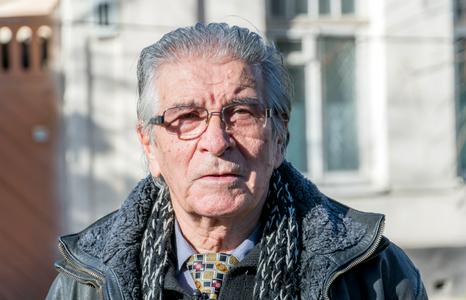 05 February05.02The “Guardian” of Old Tashkent Has Passed AwayRenowned local historian and popularizer of Uzbekistan’s history Boris Anatolyevich Golender dies
05 February05.02The “Guardian” of Old Tashkent Has Passed AwayRenowned local historian and popularizer of Uzbekistan’s history Boris Anatolyevich Golender dies -
 23 December23.12PhotoTokyo DriveJapan to invest about $20 billion in projects across Central Asia over five years
23 December23.12PhotoTokyo DriveJapan to invest about $20 billion in projects across Central Asia over five years -
 17 December17.12Sake for SixCentral Asia’s Rapprochement with Japan Comes with Hidden Pitfalls
17 December17.12Sake for SixCentral Asia’s Rapprochement with Japan Comes with Hidden Pitfalls -
 24 November24.11Here’s a New TurnRussian Scientists Revive the Plan to Irrigate Central Asia Using Siberian Rivers
24 November24.11Here’s a New TurnRussian Scientists Revive the Plan to Irrigate Central Asia Using Siberian Rivers -
 11 November11.11To Live Despite All HardshipUzbek filmmaker Rashid Malikov on his new film, a medieval threat, and the wages of filmmakers
11 November11.11To Live Despite All HardshipUzbek filmmaker Rashid Malikov on his new film, a medieval threat, and the wages of filmmakers -
 22 October22.10Older Than the Eternal CityWhat has Samarkand accomplished in its three thousand years of existence?
22 October22.10Older Than the Eternal CityWhat has Samarkand accomplished in its three thousand years of existence?
